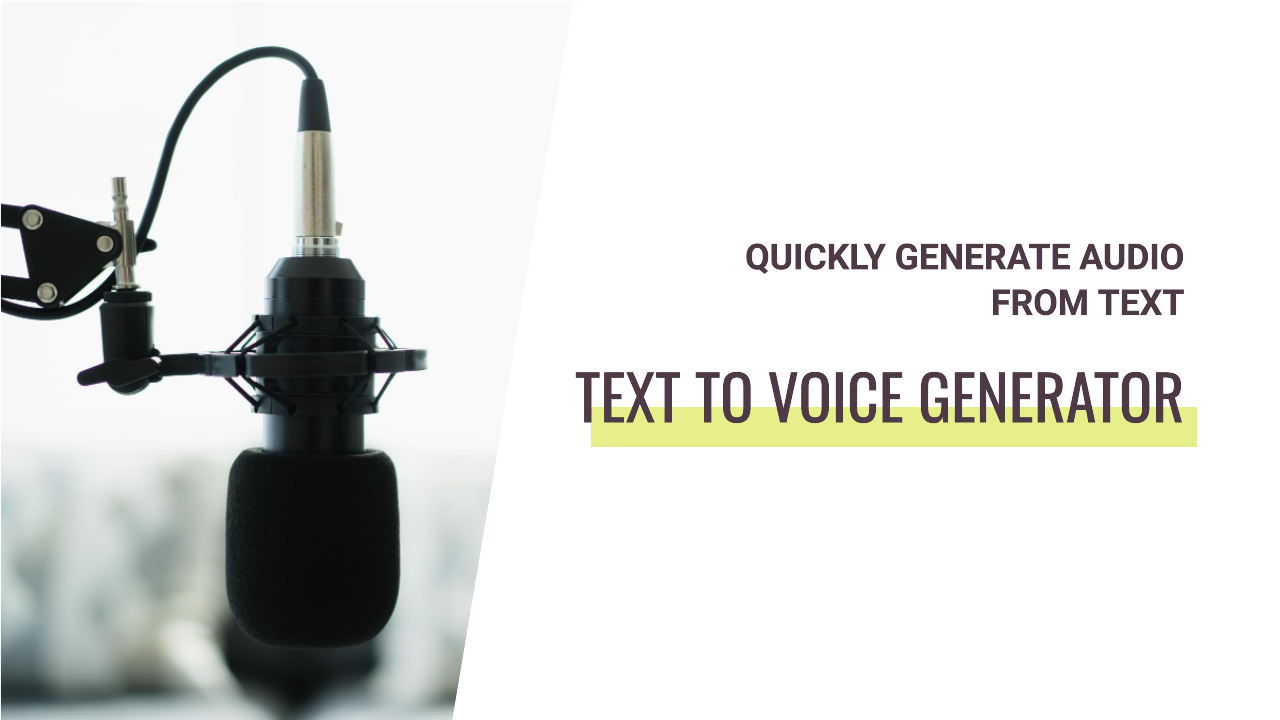Voice Generation from Text: The Power of Synthetic Speech

In an era marked by rapid advancements in technology, the capability to generate human-like voices from text has become a groundbreaking innovation. This transformative process, known as text-to-speech (TTS) technology, allows written words to be converted into audible speech, opening up a world of possibilities in accessibility, entertainment, communication, and beyond. In this 1000-word essay, we will explore the evolution of voice generation from text, its applications, challenges, and the impact it has on society.
The Evolution of Voice Generation from Text
The roots of voice generation from text can be traced back to early attempts to replicate human speech mechanically. Inventors and scientists in the 18th century, such as Wolfgang von Kempelen, experimented with mechanical devices to mimic human speech. However, these early endeavors were far from perfect and often sounded robotic and unnatural.
The 20th century marked significant progress in the field of speech synthesis. The invention of the first electronic speech synthesizer in the 1930s was a crucial milestone. The advent of computers in the mid-20th century propelled speech synthesis to new heights. One notable achievement was the creation of the vocoder by Bell Labs during World War II, a precursor to modern TTS technology that allowed secure voice communication.
Today, we have reached a stage where TTS systems employ artificial intelligence, natural language processing, and deep learning algorithms to generate incredibly realistic and human-like voices from text. These systems have not only conquered the task of replicating speech but have also managed to convey nuances such as tone, pitch, and emotional expression.
Applications of Voice Generation from Text
- Accessibility: TTS technology has been a game-changer for individuals with visual impairments. Screen readers and TTS software enable them to access digital content by converting text to speech. This makes books, articles, websites, and more accessible to those who are blind or visually impaired.
- Voice Assistants: Voice-activated virtual assistants like Siri, Alexa, and Google Assistant heavily rely on TTS technology. These virtual assistants provide information, perform tasks, and respond to user queries, enhancing convenience in our daily lives.
- Language Learning: TTS technology is employed in language learning applications, helping learners with pronunciation, fluency, and listening comprehension. Users can hear correct pronunciations and practice their speaking skills.
- Audiobooks and Podcasts: The popularity of audiobooks and podcasts has soared, with TTS technology playing a pivotal role in creating engaging narrations, making literary and informational content accessible to a wider audience.
- Assistive Communication: TTS is critical for assistive communication devices that cater to individuals with speech disorders or conditions that affect their ability to communicate verbally.
Challenges in Voice Generation from Text
Despite remarkable progress, voice generation from text still faces several challenges:
- Naturalness: Achieving complete naturalness in synthetic speech remains an ongoing challenge. While great strides have been made, TTS voices may still exhibit traces of robotic intonation.
- Multilingualism: Developing TTS systems that can accurately replicate speech in multiple languages and dialects is complex, as each language presents unique challenges and nuances.
- Emotional Expression: Conveying emotional nuances in synthetic speech is challenging. While TTS can mimic some emotional cues, it often lacks the depth and subtlety of human speech.
- Ethical Concerns: The use of TTS technology gives rise to ethical concerns, especially in the context of deepfake audio, where malicious actors can use manipulated voices for deception, fraud, or impersonation.
Ethical Implications
The rapid evolution of voice generation from text brings forth a host of ethical considerations:
- Misinformation: The technology’s ability to create highly convincing synthetic voices introduces the risk of misinformation and the spread of fake news. Manipulated audio can be used to deceive and mislead people.
- Privacy: The recording and synthesis of voices can raise privacy concerns, as voice data can be exploited or misused without consent.
- Authenticity: The widespread use of TTS voices in various applications may diminish the authenticity of human communication. This can lead to a lack of transparency and the challenge of distinguishing between human and synthetic voices.
- Dependency: While TTS technology offers substantial benefits, there is a concern that excessive reliance on it could hinder the development of natural communication skills and reduce human interaction.
Reference https://texttosound.com/about-
Conclusion
Voice generation from text has come a long way, revolutionizing accessibility, communication, and entertainment across various domains. From its historical roots in mechanical devices to today’s advanced deep learning algorithms, TTS technology has reshaped how we engage with the written word. However, it is not without its challenges, from achieving complete naturalness to addressing ethical concerns surrounding its use.
The responsible development and use of voice generation from text are essential. It should be harnessed to empower individuals, improve accessibility, and enhance communication while being mindful of its potential for misuse and the ethical implications it poses. As we continue to advance this technology, maintaining a balance between innovation and ethical responsibility is vital to ensure that voice generation from text remains a positive force in our society.
